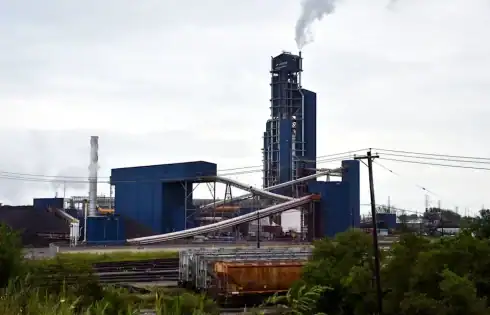
Cleveland-Cliffs reported rising demand for its steel in the third quarter, and said it will explore producing rare-earth minerals, as the Trump administration’s trade policy rewards its U.S. footprint.
Lourenco Goncalves, chief executive of the Cleveland-based steel company, on Monday directly credited the current U.S. trade policy, which includes a 50% tariff on steel, for helping it seal new steel-supply deals with major auto companies.
“It’s now widely accepted and understood that tariffs are here to stay,” Goncalves said in the company’s third-quarter earnings call. “The only effective way to avoid tariffs is manufacturing in the United States.”
The added demand helped the Cleveland-based company’s sales grow to $4.73 billion in the third quarter ended Sept. 30, up from $4.57 billion a year earlier. Analysts expected $4.9 billion, according to FactSet.
Goncalves also said Cleveland-Cliffs is looking to expand its presence in domestic rare-earth metal production, examining mining sites in Michigan and Minnesota that show key indicators of rare-earth minerals.
Cleveland Cliffs shares rose 17% in early trading to $15.56. The stock is up nearly 70% so far this year.
The push into domestic rare-earth minerals fits with the Trump administration’s attempt to boost domestic production of the metals. Used in a range of products including consumer electronics, renewable-energy systems and military technology, the metals have become a recent flashpoint in the trade tensions between the U.S. and China.
The rare-earth mining sites “would align Cleveland-Cliffs with the broader national strategy for critical material independence, similar to what we achieved in steel,” Goncalves said in a statement.
Earlier this month China, the dominant producer of rare earths, tightened export controls of products with the metals, leading Trump to threaten an additional 100% tariff on Chinese imports.
China said foreign suppliers would have to gain approval to export products with certain rare-earth materials if they account for at least 0.1% of the good’s total value. Beijing said products with military uses generally would not be approved.
Shares of rare-earth metal companies have rallied in recent weeks as a result of the heightened trade tensions. The sector also got a boost earlier this year, when the Pentagon took a 15% stake in MP Materials, America’s largest rare-earths miner.
Last week, JPMorgan said it would invest $10 billion in companies critical to U.S. national security, including rare-earth producers.
Cleveland-Cliffs’s steel business, meanwhile, continues to benefit from the trade policy. It entered a memorandum of understanding with a global steel producer seeking to benefit from Cleveland-Cliffs’s U.S. production, the company said.
“As a result of this new trade environment, we have won new and growing supply arrangements with all major automotive [original equipment manufacturers],” Goncalves said. “Many of these customers have told us directly that they want to reduce their exposure to tariffs and to foreign volatility.”
Cleveland Cliffs posted a third-quarter loss of $251 million, or 51 cents a share, compared with a loss of $244 million, or 52 cents a share, the year prior.
Adjusted earnings were 45 cents a share, in line with analysts’ expectations, according to FactSet.
